- Joined
- Feb 26, 2009
- Messages
- 277,087
- Reaction score
- 8
It’s hard to believe that only a few months ago a fair proportion of my working hours for the Angling Trust was taken up with campaigning about low flows and the general lack of water in our rivers. The Chiltern chalk-streams had been reduced to a trickle and Environment Agency staff were engaged in an increasing number of fish rescues up and down the country as rivers dried out. Fast forward to February and the twin delights of Storms Ciara and Dennis – no fishing for anyone halfway sane over those weekends – and the last thing any angler is worried about is whether their local river might be running low and clear.
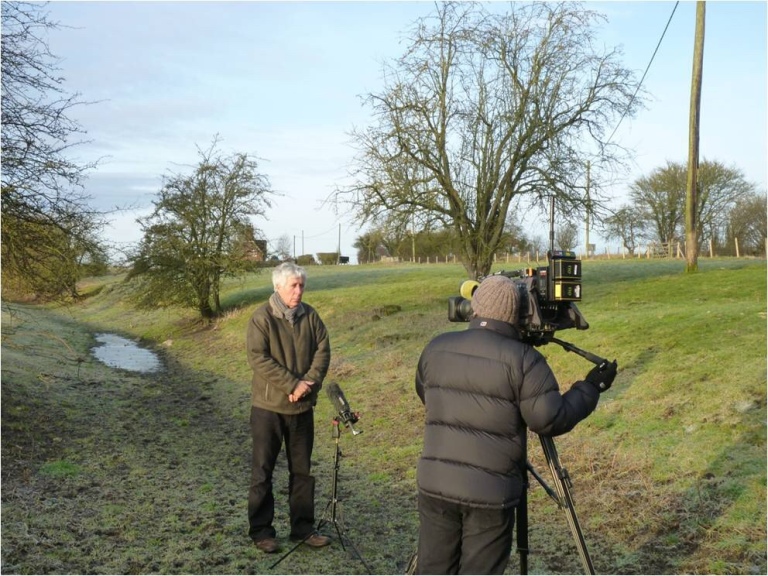
Believe it or not this is the Kennet just above Marlborough in January 2012
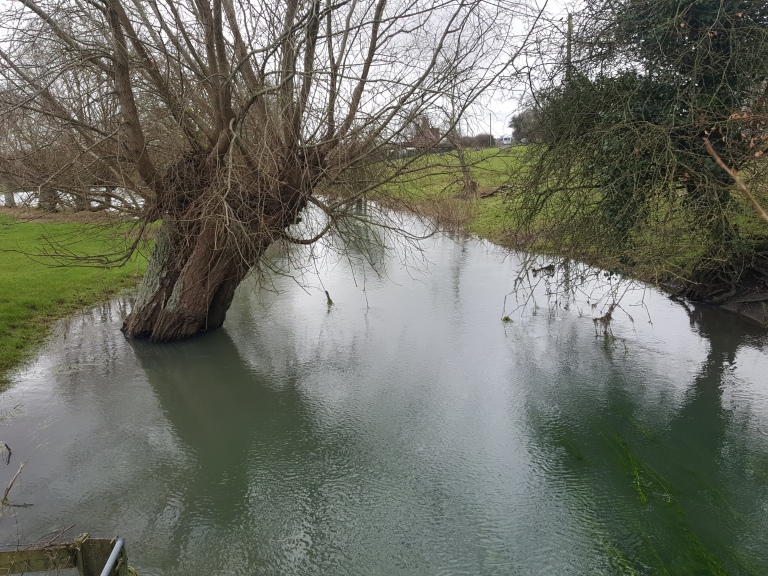
And the same stretch of river last month
Somewhat predictably such weather reignites the whole Close Season debate again amongst those disappointed with outcome last year which saw the Environment Agency opt for ‘No Change’ following an inconclusive and poorly supported public consultation response. I’m as frustrated as anyone else at not being able to get on to some of my favourite stretches of river this winter but I certainly don’t subscribe to the view that anglers should be entitled to a rebate on their rod licence every time there’s a wet winter. On that basis we should be paying the EA more in dry weather!
The fact of the matter is that we better get used to these extreme weather events and adapt our fishing accordingly. In just two short years we experienced summer heatwaves in 2018 and 2019, leading to near drought conditions in some areas, last winter’s ‘Beast from the East’, through to the storms and record rainfall levels that we are seeing right now. In my old job I had the privilege of sharing an office in the House of Commons with my old friend and Southampton MP Dr. Alan Whitehead. Now as well as being a thoroughly nice bloke Alan was something of an authority on climate change. So I sat him down one day and asked him to explain it to me in layman’s language. “It’s quite simple” he told me. “Climate Change means more weather – lots more weather. More floods, more droughts, more wind, more heat, more cold snaps, more extremes of everything.” And was there never a truer word spoken in that place. For those who still doubt that our climate is changing just check out the temperatures rises over the last decade.
Climate change: Last decade confirmed as warmest on record
Climate change: Last decade confirmed as warmest on record - BBC News
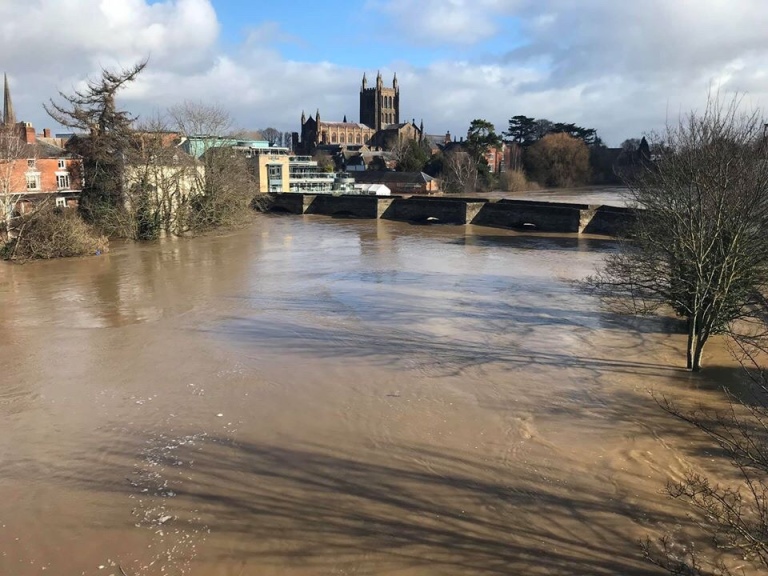
The Wye in Hereford hit record levels in the aftermath of Storm Dennis
So how did all this weather affect your fishing this winter? I know some diehard river anglers who have barely been on the bank since October whilst on the other hand a few of my friends who enjoy their winter carping have had successful sessions when the big low pressure systems have piled in and stirred the fish into feeding. Much as I enjoy my stillwater fishing for bream, tench and crucians I find lakes rather bleak places once the leaves are off the trees. Living here in Reading I’m lucky enough to have a wide range of rivers and canals within an hour or so drive from my house, meaning that it’s rare to find a day when there isn’t somewhere fishable to be found. Little rivers like the Surrey Blackwater rise and fall back again within 48 hours, that’s far less time than it takes for the mighty Thames to hit its peak following heavy rain. Then there are chalk streams like the Hampshire Avon, Itchen and Kennet which, being largely spring fed, respond more benignly to rainfall over their catchments than their cousins the Stour, Loddon and Bristol Avon which are out and out spate rivers. I keep the EA river gauges for all my favourite rivers on my iPad and can predict with reasonable accuracy which will be worth visiting in different conditions. The exceptions of course are these storm events where only the mad or the desperate would consider venturing forth.
Given all this technology and the diversity of venues at my disposal it is hardly surprising that I was able to put a few fish on the bank despite the conditions. However, many plans had to be curtailed in favour opportunistic trips to coincide with various windows in the weather including my winter perch campaign. As usual the late summer roach fishing was excellent on the Thames but this year I heard enough stories about huge perch following in hooked roach that I really wanted to try and catch my first four pounder from the river. I sorted out a promising local stretch but only managed two trips before the rains came in November and knocked it all on the head. I was well pleased with those sessions as several twos and a cracking fish of 3.04 were landed but I doubt the flow will subside for long enough to allow the fish to return to that area before March 15th comes around.
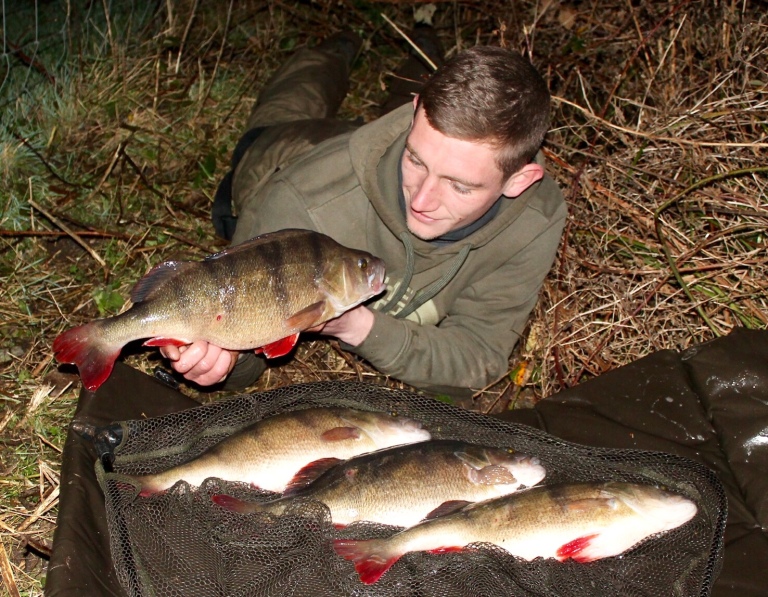
The Reading & District AA stretches of the lower Kennet produced some fine bags of perch this winter
Now the Kennet may not be the river it once was for chub and barbel – the gravel spawning species have had a tough time since the canal re-opened in 1990 – but the perch fishing can be spectacular at times. On the Reading & District AA waters the lower river flows in and out of the canal creating the slower deeper stretches, backwaters and confluences that the big perch seem to love. High coloured water is a bonus for us Kennet perchers as it concentrates the fish in places where we can find them and that is half the battle. Gin clear water usually means that bites are confined to the low light periods at dusk and dawn. Not so in murkier conditions when the perch can snaffle a lobworm at any time of day. Some spectacular catches have been made on the Kennet system this winter and I know of several multiple bags of 3lb plus perch with best fish nudging 4lbs. The canal has given me and my friends plenty of reliable sport but my largest fish of 3.03 came from a confluence with the main river.
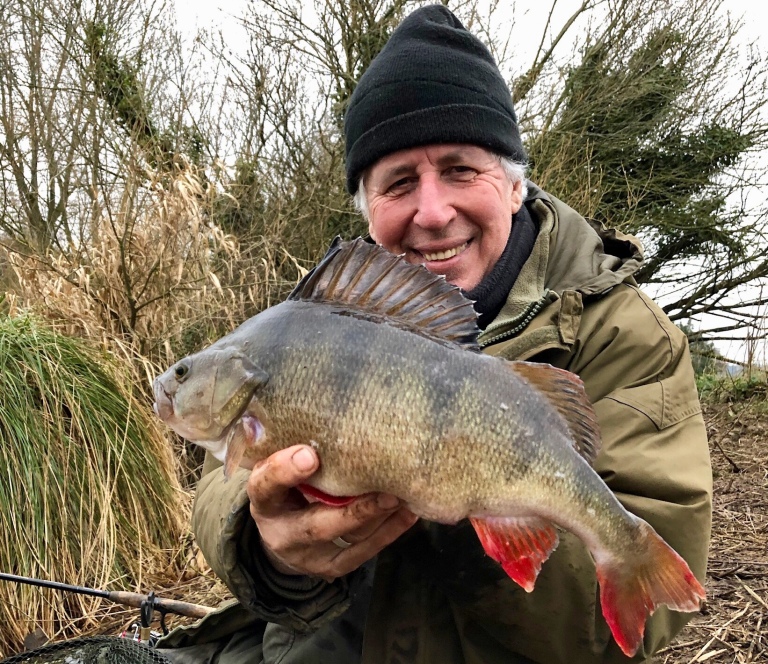
Martin’s best Kennet perch of the winter so far
If there’s one species that doesn’t like high coloured water it’s the chub. Every winter I target these brassy battlers on the Thames, Avon and more recently, the lovely little River Itchen. Sadly, there have been precious few days when conditions were right but in the gaps between the floods I was able to winkle out a few decent fish. On the Thames I usually rove around ledgering bread or cheesepaste while on the Hampshire chalkstreams trotting maggots is the way to go. Until relatively recently Thames chubbing was often a case of ‘big fish or bust’ but the last four seasons has seen an explosion in chublets, many of which are now over a pound. A great sign for the future as although I like catching big fish as much as the next angler, I’m not a daft enough to think that fishing in an old folks home offers much of a future.
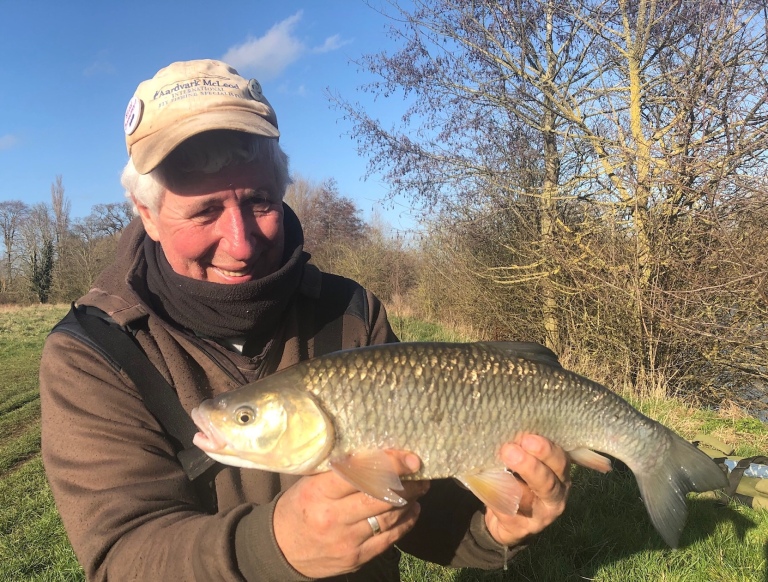
Good to see chub of all sizes now in the Thames
Although my chub sessions were few in number they made up for it in action. My one and only trip to the Itchen saw seven beautiful fish up to five pounds come to the net before I latched into something that felt like a chub of a lifetime. When, after four or five minutes of violent struggle the beastie still refused come off the bottom I began to wonder what on earth I had hooked. Eventually she tired and as those pearl coloured pectoral fins came into view I realised that I was attached to a rare middle Itchen barbel. It’s a testimony to the quality of Mr Drennan’s superspade hooks that the tiny number 18 stayed put and I was able to hoist 7.12 of bristling barbel muscle onto the scales.
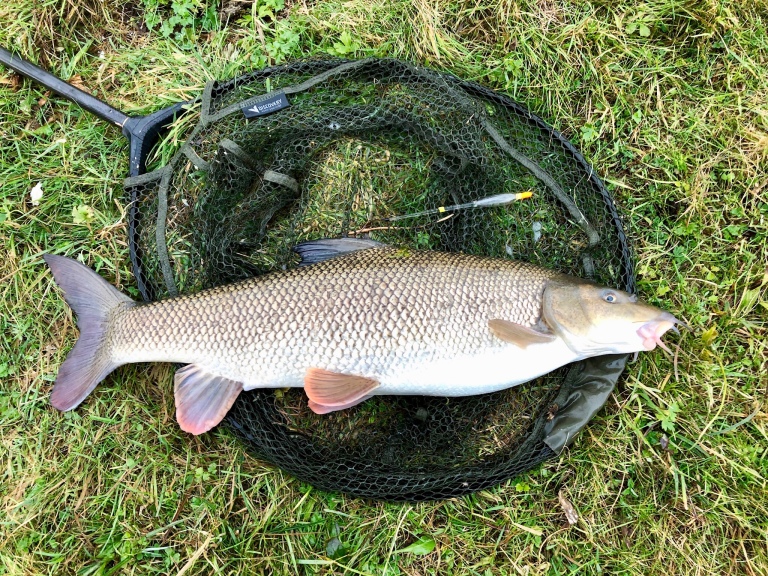
A rare middle Itchen barbel which did a passable impression of a record chub
The Hampshire Avon chub have received comparatively little pressure this winter on account of most anglers being unwilling to wade through half a mile of flooded water meadows to find the riverbank. Not so my good friend Sean Geer who considers such things part and parcel of winter chubbing. With the river running clear and dropping, although still a foot over its bank in places, Sean decreed that it was time to have a go. I insisted that we take along our tripods so there was at least somewhere to hang our gear once we actually found where the river’s edge began and the fields ended. I wouldn’t necessarily advise fishing in such conditions but, as hopefully you can see from the pictures, the gin clear water was easy to navigate and never came above knee height.
If flooded banks and 30 mph gusts of wind weren’t enough I had the deep joy of smashing yet another expensive carbon float rod on an Avon chub. This time is wasn’t the infamous Drennan Acolyte, or ‘Crackolite’ as I’ve heard it called. It was my precious 13/15 ft Daiwa Tournament which smashed just above the butt section as I bent into the second chub of the day. I can only surmise that I bashed the thing squeezing through a tight gate on to the fishery as it’s pretty rare to have a rod go in that area. Luckily for me the break was in in the short dolly section so I was able to set up again at 13 ft but I can tell you it wasn’t easy trying to ease a float down a narrow far bank crease in a howling gale on a flooded river. Constant feeding with red maggots brought the chub out of their cover and up into the slacker water above the trees where I could at least present the bait to them in a halfway acceptable manner. These Avon chub are big and wary and whilst the first couple came on a 0.13 hooklink and No 18 it wasn’t long before they wouldn’t look and anything heavier than a 20 to 0.11 which meant it was ‘squeaky bum time’ every time they got into that powerful flow.
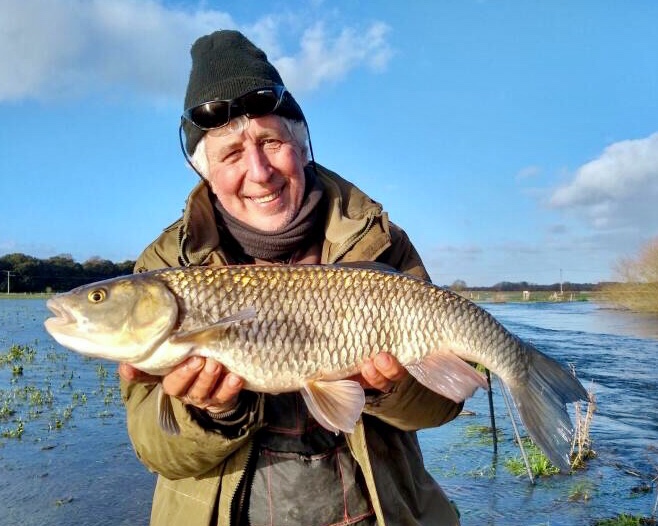
Well worth the effort – 6.03 of Avon chub in a flood
I was delighted with a final haul of five fish from eight bites. Two bounced off after I failed to set the hook properly through the wind blown line and one came off, unsurprisingly, when the rod shattered. They were all big, brassy fish in fantastic winter condition with best one weighing in at 6.03. Landing them was a mission in these conditions and I even resorted to beaching a 5.15 in the water meadow through a gap in bank when it simply refused to tow me far enough downstream to where my landing net was positioned. Not something I’d recommend!
The only other species of note that has come my way this winter has been the dace which is making something of a comeback on a few rivers in the South. The lower Test has some wonderful specimens and I predict that a new record will come off this river in the next couple years. Not as wild a claim as you might think given that a 1.03 specimen came from a well known swim on the Broadlands fishery from which I had extracted a nice bag of roach, dace and grayling the day before. With about a million minnows concentrated in the only bit of quiet water for half a mile I opted to trot the swim with sweetcorn which is a surprisingly good winter bait on some rivers. I guess I had dace up to about ten ounces but on the following day a syndicate regular dropped into the same spot and link ledgered a single grain of corn to land a fish that will probably be a record breaker in a month’s time from now.
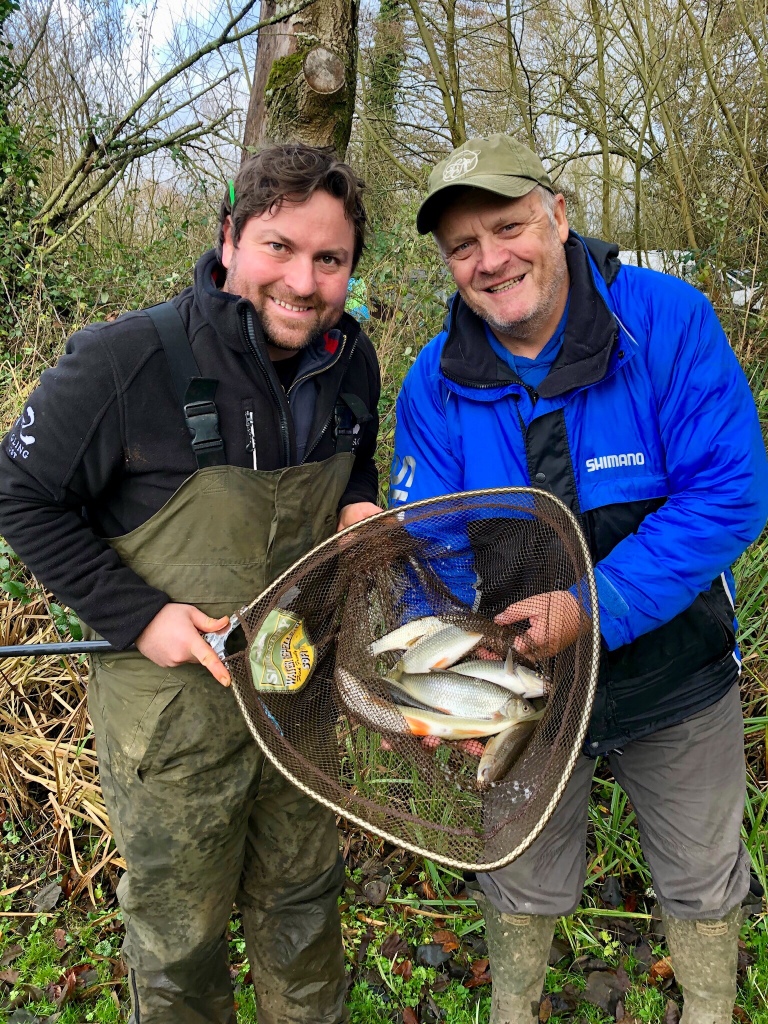
Happy Dace are here again! Dave Lewis and Jamie Cook with some Kennet Crackers
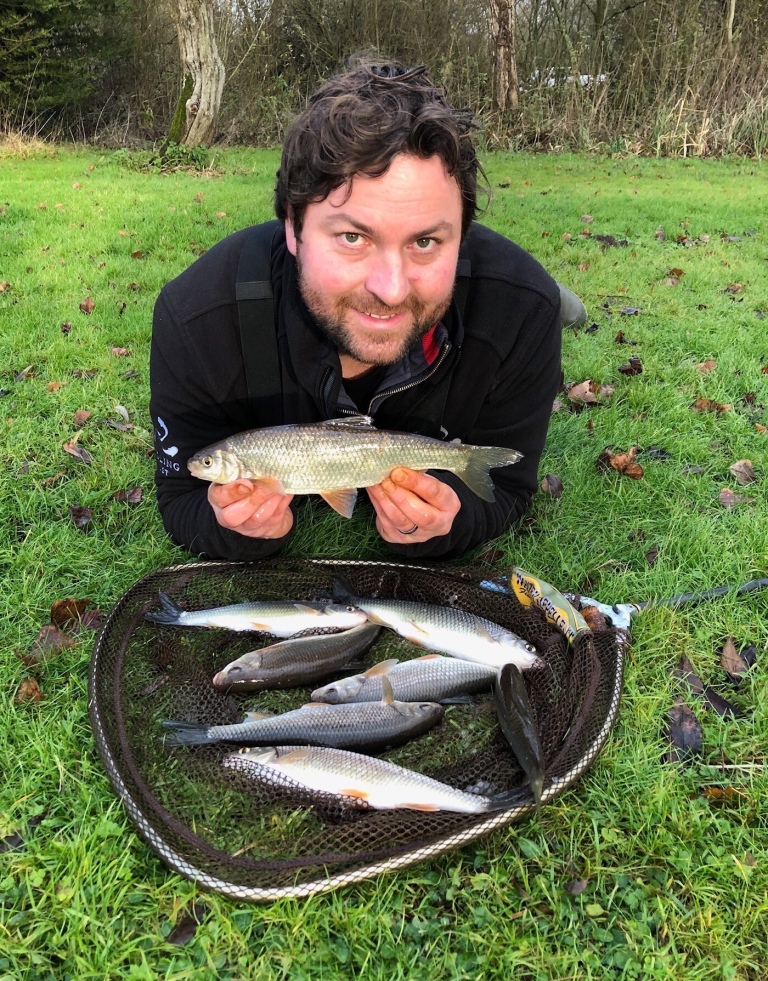
New Angling Trust boss Jamie Cook is no slouch with the stick float
As most people will be aware the Angling Trust’s new Chief Executive is Jamie Cook – a fine angler with a good business background who I have known for many years. In the time while Jamie was working out his notice period one of my jobs was to set up for him to meet various Angling Trust ambassadors and other influential people in our sport. One of these was Dave Lewis, the veteran Sea Angler columnist and angling guide who I got to know on a recent trip to Belize chasing bonefish. The early December weather meant that the sea was firmly off limits but luckily both Dave and I have a mutual friend in Rob Starr, one of the river keepers on the upper Kennet. Both Dave and Jamie love the Kennet so we booked a day chasing big dace and grayling on a swollen but still fishable, special piece of river that sees very little angling pressure. Once we worked out how to best avoid the trout we all put together a lovely catch of fish on the stick float including a good number of dace over 12ozs. Looking at the smiles on the faces of these two guys, both of whom are used to catching pretty big fish, I couldn’t help thinking how important it is to keep a sense of perspective and enjoy our encounters with the great variety of species that live in our waters and which it is our privilege to be able to catch.
As I write this Storm Dennis has just passed through wreaking all kinds of havoc and destruction. The Wye in Hereford along with several other rivers have hit a record flood peaks and sadly lives have been lost. It seems churlish to moan about lost fishing opportunities in the face of such devastation but I do hope that the rain holds off long enough for us to get back on the banks before March 15th. There’s no doubt that our rivers were in need of a flush through in the Autumn but we’ve now had too much of good thing!
Martin Salter

Believe it or not this is the Kennet just above Marlborough in January 2012

And the same stretch of river last month
Somewhat predictably such weather reignites the whole Close Season debate again amongst those disappointed with outcome last year which saw the Environment Agency opt for ‘No Change’ following an inconclusive and poorly supported public consultation response. I’m as frustrated as anyone else at not being able to get on to some of my favourite stretches of river this winter but I certainly don’t subscribe to the view that anglers should be entitled to a rebate on their rod licence every time there’s a wet winter. On that basis we should be paying the EA more in dry weather!
The fact of the matter is that we better get used to these extreme weather events and adapt our fishing accordingly. In just two short years we experienced summer heatwaves in 2018 and 2019, leading to near drought conditions in some areas, last winter’s ‘Beast from the East’, through to the storms and record rainfall levels that we are seeing right now. In my old job I had the privilege of sharing an office in the House of Commons with my old friend and Southampton MP Dr. Alan Whitehead. Now as well as being a thoroughly nice bloke Alan was something of an authority on climate change. So I sat him down one day and asked him to explain it to me in layman’s language. “It’s quite simple” he told me. “Climate Change means more weather – lots more weather. More floods, more droughts, more wind, more heat, more cold snaps, more extremes of everything.” And was there never a truer word spoken in that place. For those who still doubt that our climate is changing just check out the temperatures rises over the last decade.
Climate change: Last decade confirmed as warmest on record
Climate change: Last decade confirmed as warmest on record - BBC News

The Wye in Hereford hit record levels in the aftermath of Storm Dennis
So how did all this weather affect your fishing this winter? I know some diehard river anglers who have barely been on the bank since October whilst on the other hand a few of my friends who enjoy their winter carping have had successful sessions when the big low pressure systems have piled in and stirred the fish into feeding. Much as I enjoy my stillwater fishing for bream, tench and crucians I find lakes rather bleak places once the leaves are off the trees. Living here in Reading I’m lucky enough to have a wide range of rivers and canals within an hour or so drive from my house, meaning that it’s rare to find a day when there isn’t somewhere fishable to be found. Little rivers like the Surrey Blackwater rise and fall back again within 48 hours, that’s far less time than it takes for the mighty Thames to hit its peak following heavy rain. Then there are chalk streams like the Hampshire Avon, Itchen and Kennet which, being largely spring fed, respond more benignly to rainfall over their catchments than their cousins the Stour, Loddon and Bristol Avon which are out and out spate rivers. I keep the EA river gauges for all my favourite rivers on my iPad and can predict with reasonable accuracy which will be worth visiting in different conditions. The exceptions of course are these storm events where only the mad or the desperate would consider venturing forth.
Given all this technology and the diversity of venues at my disposal it is hardly surprising that I was able to put a few fish on the bank despite the conditions. However, many plans had to be curtailed in favour opportunistic trips to coincide with various windows in the weather including my winter perch campaign. As usual the late summer roach fishing was excellent on the Thames but this year I heard enough stories about huge perch following in hooked roach that I really wanted to try and catch my first four pounder from the river. I sorted out a promising local stretch but only managed two trips before the rains came in November and knocked it all on the head. I was well pleased with those sessions as several twos and a cracking fish of 3.04 were landed but I doubt the flow will subside for long enough to allow the fish to return to that area before March 15th comes around.

The Reading & District AA stretches of the lower Kennet produced some fine bags of perch this winter
Now the Kennet may not be the river it once was for chub and barbel – the gravel spawning species have had a tough time since the canal re-opened in 1990 – but the perch fishing can be spectacular at times. On the Reading & District AA waters the lower river flows in and out of the canal creating the slower deeper stretches, backwaters and confluences that the big perch seem to love. High coloured water is a bonus for us Kennet perchers as it concentrates the fish in places where we can find them and that is half the battle. Gin clear water usually means that bites are confined to the low light periods at dusk and dawn. Not so in murkier conditions when the perch can snaffle a lobworm at any time of day. Some spectacular catches have been made on the Kennet system this winter and I know of several multiple bags of 3lb plus perch with best fish nudging 4lbs. The canal has given me and my friends plenty of reliable sport but my largest fish of 3.03 came from a confluence with the main river.

Martin’s best Kennet perch of the winter so far
If there’s one species that doesn’t like high coloured water it’s the chub. Every winter I target these brassy battlers on the Thames, Avon and more recently, the lovely little River Itchen. Sadly, there have been precious few days when conditions were right but in the gaps between the floods I was able to winkle out a few decent fish. On the Thames I usually rove around ledgering bread or cheesepaste while on the Hampshire chalkstreams trotting maggots is the way to go. Until relatively recently Thames chubbing was often a case of ‘big fish or bust’ but the last four seasons has seen an explosion in chublets, many of which are now over a pound. A great sign for the future as although I like catching big fish as much as the next angler, I’m not a daft enough to think that fishing in an old folks home offers much of a future.

Good to see chub of all sizes now in the Thames
Although my chub sessions were few in number they made up for it in action. My one and only trip to the Itchen saw seven beautiful fish up to five pounds come to the net before I latched into something that felt like a chub of a lifetime. When, after four or five minutes of violent struggle the beastie still refused come off the bottom I began to wonder what on earth I had hooked. Eventually she tired and as those pearl coloured pectoral fins came into view I realised that I was attached to a rare middle Itchen barbel. It’s a testimony to the quality of Mr Drennan’s superspade hooks that the tiny number 18 stayed put and I was able to hoist 7.12 of bristling barbel muscle onto the scales.

A rare middle Itchen barbel which did a passable impression of a record chub
The Hampshire Avon chub have received comparatively little pressure this winter on account of most anglers being unwilling to wade through half a mile of flooded water meadows to find the riverbank. Not so my good friend Sean Geer who considers such things part and parcel of winter chubbing. With the river running clear and dropping, although still a foot over its bank in places, Sean decreed that it was time to have a go. I insisted that we take along our tripods so there was at least somewhere to hang our gear once we actually found where the river’s edge began and the fields ended. I wouldn’t necessarily advise fishing in such conditions but, as hopefully you can see from the pictures, the gin clear water was easy to navigate and never came above knee height.
If flooded banks and 30 mph gusts of wind weren’t enough I had the deep joy of smashing yet another expensive carbon float rod on an Avon chub. This time is wasn’t the infamous Drennan Acolyte, or ‘Crackolite’ as I’ve heard it called. It was my precious 13/15 ft Daiwa Tournament which smashed just above the butt section as I bent into the second chub of the day. I can only surmise that I bashed the thing squeezing through a tight gate on to the fishery as it’s pretty rare to have a rod go in that area. Luckily for me the break was in in the short dolly section so I was able to set up again at 13 ft but I can tell you it wasn’t easy trying to ease a float down a narrow far bank crease in a howling gale on a flooded river. Constant feeding with red maggots brought the chub out of their cover and up into the slacker water above the trees where I could at least present the bait to them in a halfway acceptable manner. These Avon chub are big and wary and whilst the first couple came on a 0.13 hooklink and No 18 it wasn’t long before they wouldn’t look and anything heavier than a 20 to 0.11 which meant it was ‘squeaky bum time’ every time they got into that powerful flow.

Well worth the effort – 6.03 of Avon chub in a flood
I was delighted with a final haul of five fish from eight bites. Two bounced off after I failed to set the hook properly through the wind blown line and one came off, unsurprisingly, when the rod shattered. They were all big, brassy fish in fantastic winter condition with best one weighing in at 6.03. Landing them was a mission in these conditions and I even resorted to beaching a 5.15 in the water meadow through a gap in bank when it simply refused to tow me far enough downstream to where my landing net was positioned. Not something I’d recommend!
The only other species of note that has come my way this winter has been the dace which is making something of a comeback on a few rivers in the South. The lower Test has some wonderful specimens and I predict that a new record will come off this river in the next couple years. Not as wild a claim as you might think given that a 1.03 specimen came from a well known swim on the Broadlands fishery from which I had extracted a nice bag of roach, dace and grayling the day before. With about a million minnows concentrated in the only bit of quiet water for half a mile I opted to trot the swim with sweetcorn which is a surprisingly good winter bait on some rivers. I guess I had dace up to about ten ounces but on the following day a syndicate regular dropped into the same spot and link ledgered a single grain of corn to land a fish that will probably be a record breaker in a month’s time from now.

Happy Dace are here again! Dave Lewis and Jamie Cook with some Kennet Crackers

New Angling Trust boss Jamie Cook is no slouch with the stick float
As most people will be aware the Angling Trust’s new Chief Executive is Jamie Cook – a fine angler with a good business background who I have known for many years. In the time while Jamie was working out his notice period one of my jobs was to set up for him to meet various Angling Trust ambassadors and other influential people in our sport. One of these was Dave Lewis, the veteran Sea Angler columnist and angling guide who I got to know on a recent trip to Belize chasing bonefish. The early December weather meant that the sea was firmly off limits but luckily both Dave and I have a mutual friend in Rob Starr, one of the river keepers on the upper Kennet. Both Dave and Jamie love the Kennet so we booked a day chasing big dace and grayling on a swollen but still fishable, special piece of river that sees very little angling pressure. Once we worked out how to best avoid the trout we all put together a lovely catch of fish on the stick float including a good number of dace over 12ozs. Looking at the smiles on the faces of these two guys, both of whom are used to catching pretty big fish, I couldn’t help thinking how important it is to keep a sense of perspective and enjoy our encounters with the great variety of species that live in our waters and which it is our privilege to be able to catch.
As I write this Storm Dennis has just passed through wreaking all kinds of havoc and destruction. The Wye in Hereford along with several other rivers have hit a record flood peaks and sadly lives have been lost. It seems churlish to moan about lost fishing opportunities in the face of such devastation but I do hope that the rain holds off long enough for us to get back on the banks before March 15th. There’s no doubt that our rivers were in need of a flush through in the Autumn but we’ve now had too much of good thing!
Martin Salter
Last edited by a moderator:
